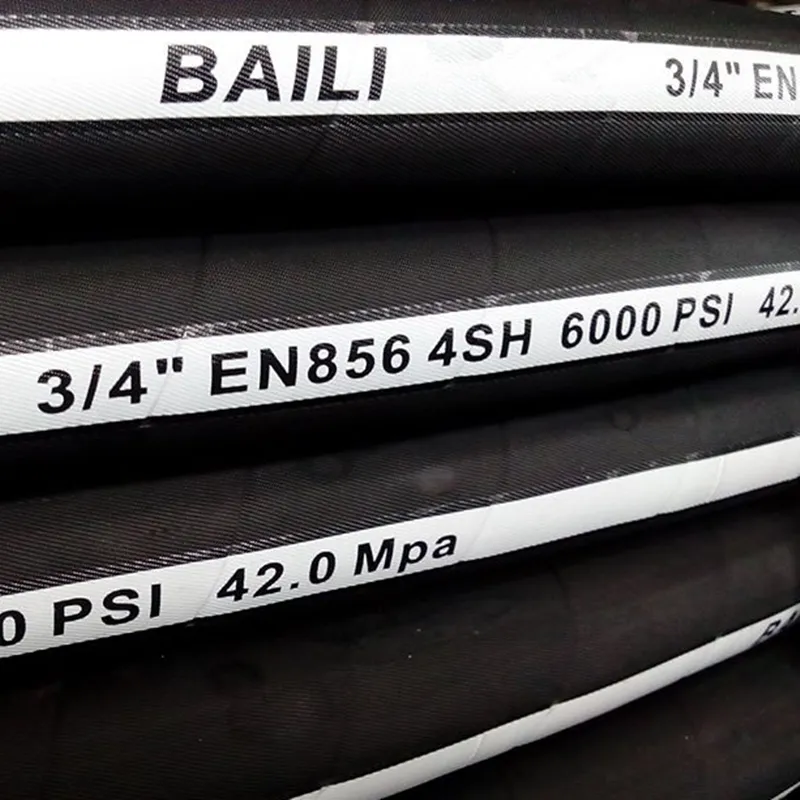Қыр . 02, 2024 20:16 Back to list
Famous Heat Resistant Hydraulic Hose - High Performance and Durability
The Importance of Heat-Resistant Hydraulic Hoses in Modern Industries
In today's industrial landscape, the reliability of machinery and equipment is paramount for efficient operations. One of the critical components that ensure the smooth functioning of hydraulic systems is the hydraulic hose. Among the various types available, heat-resistant hydraulic hoses stand out due to their ability to perform under extreme temperatures while maintaining safety and efficiency.
Heat-resistant hydraulic hoses are specifically designed to withstand high temperatures that can occur in various industrial applications. These hoses are often constructed from advanced materials that provide enhanced thermal stability, ensuring that they do not degrade or fail in high-heat environments. As industries such as construction, mining, and manufacturing ramp up their operations, the demand for these durable hoses has surged.
One of the most notable features of heat-resistant hydraulic hoses is their ability to handle both high pressure and extreme temperature fluctuations. In hydraulic systems, fluids are circulated under significant pressure, and any failure can result in catastrophic consequences. Heat-resistant hoses are engineered to maintain their structural integrity, even when exposed to hot hydraulic fluids. This capability significantly reduces the risk of leaks and bursts, which can lead to machinery downtime and costly repairs.
The typical materials used in manufacturing heat-resistant hydraulic hoses include rubber compounds and synthetic materials that can withstand temperatures well above the normal operational range. For instance, hoses constructed from EPDM (Ethylene Propylene Diene Monomer) rubber can handle temperatures from -40°C to +150°C. Other advanced materials, like fluoropolymers, can endure even higher temperatures, making them suitable for specialized applications where extreme thermal conditions are routine.
famous heat resistant hydraulic hose

In addition to their thermal resistance, these hoses are also designed with abrasion and chemical resistance in mind. In many industrial settings, hydraulic hoses are exposed to harsh environments that can include exposure to chemicals, oils, and abrasive particles. The combination of heat resistance and durability makes these hoses an essential part of any hydraulic system, offering longevity and reliability that can translate to significant cost savings over time.
Furthermore, the innovation in hose technology has led to improvements in flexibility and ease of installation. More flexible hoses can be maneuvered in tight spaces and bent into various configurations without compromising their performance. This flexibility helps technicians to design efficient hydraulic systems and makes maintenance easier, thereby enhancing overall productivity.
As industries continue to evolve and the demand for high-performance hydraulic systems grows, the role of heat-resistant hydraulic hoses becomes increasingly significant. They are not just a component but a vital part of ensuring operational safety and efficiency in high-stakes environments. By investing in high-quality heat-resistant hydraulic hoses, companies are making a strategic choice to enhance their resilience and reliability, ultimately leading to improved performance in their operations.
In conclusion, heat-resistant hydraulic hoses play a crucial role in modern industries, ensuring that hydraulic systems operate efficiently under demanding conditions. Their unique properties make them indispensable for a reliable and safe working environment, underscoring their importance in today's industrial applications.
-
Best Four Steel Wire Spiral Hose Hydraulic R12 – Durable High-Pressure Hose Manufacturer
NewsJul.08,2025
-
High-Quality 1/4 Hydraulic Hose – Soft, Flexible & Durable Rubber Hoses for Industrial Use
NewsJul.08,2025
-
1 1 2 Inch Hydraulic Flexible Hose - Durable, Reliable, High-Pressure Solutions
NewsJul.07,2025
-
High-Quality 1 2 Rubber Hose - Durable, Flexible Hydraulic Solutions
NewsJul.07,2025
-
Discover SAE Hydraulic Hose Types - High Quality & Durable Hoses from Leading Factory Supplier
NewsJul.06,2025
-
High Pressure Wire Hydraulic Rubber Hose Supplier Durable & Reliable 1SN Hose Solutions
NewsJul.06,2025
